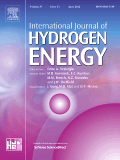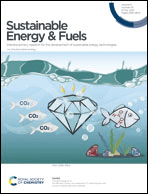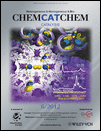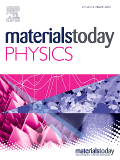
INTERNATIONAL JOURNAL OF HYDROGEN ENERGY
metrics 2024
Shaping the Future of Renewable Energy through Hydrogen Insights
Introduction
INTERNATIONAL JOURNAL OF HYDROGEN ENERGY, published by PERGAMON-ELSEVIER SCIENCE LTD, is a leading peer-reviewed journal that has been at the forefront of hydrogen energy research since its inception in 1976. With a robust impact factor and recognized as a Q1 journal in multiple categories, including Condensed Matter Physics and Energy Engineering and Power Technology, it provides a critical platform for disseminating innovative research findings, reviews, and methodologies. Researchers engaged in hydrogen production, storage, and utilization will find invaluable insights within its pages. The journal is indexed in Scopus and boasts impressive rankings across several categories, reflecting its significance in driving forward the sustainability agenda and advancing science in energy technologies. Although not an open access journal, it remains a crucial resource for academics, professionals, and students dedicated to the development of renewable energy solutions and the exploration of hydrogen's role in future energy systems.
Metrics 2024
 1.51
1.51 8.10
8.10 7.30
7.30 263
263Metrics History
Rank 2024
Scopus
IF (Web Of Science)
JCI (Web Of Science)
Quartile History
Similar Journals

Materials Chemistry Frontiers
Pioneering Research at the Intersection of Chemistry and MaterialsMaterials Chemistry Frontiers, published by the esteemed Royal Society of Chemistry, stands as a leading journal in the realm of materials science and chemistry, with an impressive Q1 ranking in both Materials Chemistry and Materials Science categories as of 2023. This open-access journal, operating from the United Kingdom, offers a platform for researchers, professionals, and students to disseminate high-quality, impactful research. With its E-ISSN 2052-1537, the journal is dedicated to publishing cutting-edge articles, reviews, and research communications that explore innovative materials and their applications, fostering a comprehensive understanding of the complex interplay between materials and their chemical properties. With consistent rankings in the Scopus metrics, being positioned at the 25th percentile among 317 in the Materials Chemistry category, it highlights its pivotal role in advancing the field. The journal thrives on contributions that broaden the scope of knowledge from 2017 to 2024 and beyond, solidifying its status as an essential resource for contemporary research in materials science.

Boletin del grupo espanol del carbon
Unveiling the Potential of Carbon MaterialsBoletin del Grupo Español del Carbon, a pivotal journal in the field of carbon science, is published by the Grupo Español Carbon and serves as a significant platform for disseminating research related to carbon materials, their applications, and advancements in carbon technology. With an ISSN of 2172-6094, this journal aims to bridge the gap between academia and industry by featuring original research articles, reviews, and noteworthy contributions from specialists in the sector. Though currently not designated as Open Access, the journal's commitment to quality ensures that the articles are available through various academic databases, enhancing accessibility for researchers, professionals, and students alike. Located in Zaragoza, Spain, at the prestigious Instituto Carboquímica, the journal endorses rigorous peer review and strives to foster international collaboration within the carbon research community. By maintaining high academic standards, Boletin del Grupo Español del Carbon aspires to impact the fields of materials science and environmental sustainability significantly.

Korean Chemical Engineering Research
Championing Sustainability in Chemical Engineering SolutionsKorean Chemical Engineering Research, published by the Korean Institute of Chemical Engineers, serves as a vital resource for those engaged in the expansive field of chemical engineering. With an ISSN of 0304-128X and an E-ISSN of 2233-9558, the journal offers a platform for scholarly articles that cover various aspects of chemical processes, innovative technologies, and sustainability practices in engineering. Despite being in the Q4 category of chemical engineering journals as per the 2023 rankings, the journal's focus on emerging research from South Korea and beyond presents unique insights valuable to professionals, researchers, and students alike. Operating under effective citation metrics, it finds its place within Scopus, ranking at 229 out of 273, indicating a niche yet specialized contribution to the broader scientific community. We invite you to explore this integral journal, which is committed to fostering discourse and development in chemical engineering through its extensive archive, dating back to 2014 and continuing to evolve through 2023.

JOURNAL OF SOLID STATE ELECTROCHEMISTRY
Advancing the Frontiers of Solid-State ElectrochemistryThe Journal of Solid State Electrochemistry is a leading peer-reviewed journal dedicated to advancing the understanding and application of solid-state electrochemical systems. Published by Springer, this prestigious journal has been a staple in the field since its establishment in 1997, with an impressive range of topics covering Condensed Matter Physics, Electrochemistry, and Materials Science. It holds a notable Q2 category quartile ranking in several disciplines, including Electrical and Electronic Engineering, and boasts significant Scopus rankings—ranked #28 in Electrochemistry, showcasing its credibility and impact in the field. With a mission to disseminate high-quality research and innovative methodologies, the journal aims to foster cross-disciplinary collaboration among researchers, professionals, and students. While not open access, articles published in the Journal of Solid State Electrochemistry are integral for those exploring cutting-edge technologies through theoretical and practical approaches, ultimately enhancing our understanding of energy systems and materials' performance. Located in Germany, the journal continues to thrive internationally, providing a robust platform for scholarly communication.

ATOMIC ENERGY
Connecting expertise to address nuclear challenges.ATOMIC ENERGY is a distinguished journal published by SPRINGER, focusing on pivotal advancements and research within the field of Nuclear Energy and Engineering. With an ISSN of 1063-4258 and an E-ISSN of 1573-8205, this journal has been a critical resource since its inception in 1956, serving both historic and contemporary scientific inquiries into nuclear technologies. Currently positioned in Q3 of the Nuclear Energy and Engineering category, ATOMIC ENERGY ranks 49 out of 77 in Scopus, representing a percentile of 37%, highlighting its relevance in the research community. While it is not an open access journal, it continues to draw a diverse readership eager to engage with the latest findings and innovations in nuclear science. The journal’s objectives include fostering collaborative research, sharing expertise, and addressing contemporary challenges in nuclear energy. As such, ATOMIC ENERGY remains an essential platform for researchers, professionals, and students alike, contributing significantly to the ongoing dialogue in the field.

Sustainable Energy & Fuels
Empowering Sustainable Innovations in Fuel TechnologySustainable Energy & Fuels is a leading journal published by the Royal Society of Chemistry, dedicated to advancing knowledge in the fields of energy engineering, fuel technology, and renewable energy solutions. With its ISSN of 2398-4902 and notable Q1 status in both Energy Engineering and Power Technology as well as Fuel Technology, this journal ranks impressively in the Scopus database, ensuring a strong platform for disseminating impactful research. The journal spans a comprehensive scope aimed at addressing the global challenges of sustainable energy, including innovative methodologies and technologies that promote environmental sustainability. Although it operates under a traditional access model, the journal is committed to providing high-quality content that engages researchers, professionals, and students alike. With significant contributions expected through 2024, Sustainable Energy & Fuels stands at the forefront of facilitating scholarly communication, inspiring advancements in energy technologies that align with sustainability goals.

ChemCatChem
Pioneering Insights in Inorganic and Organic Chemistry.ChemCatChem is a leading international journal published by WILEY-V C H VERLAG GMBH that has been making significant contributions to the fields of catalysis, inorganic and organic chemistry, as well as physical and theoretical chemistry since its inception in 2009. With an established reputation for excellence, this journal holds commendable rankings in various categories, including Q1 in Inorganic Chemistry and Q1 in Organic Chemistry, demonstrating its pivotal role in advancing scientific knowledge and innovation. Notably, it has achieved a high Scopus ranking, securing 10th place out of 79 in Inorganic Chemistry, among others, showcasing its influence and quality. Although open access options are not available, the journal offers cutting-edge research articles, reviews, and insights that are vital for researchers, professionals, and students aiming to stay at the forefront of chemical science. With its address rooted in Weinheim, Germany, and convergence projected to continue until 2024, ChemCatChem remains a dynamic platform for disseminating vital advancements within the chemical community.

eScience
Leading the Charge in Environmental Science and InnovationeScience, published by KEAI PUBLISHING LTD, is an innovative open-access journal that has rapidly established itself as a leading platform in the fields of Electrochemistry, Materials Chemistry, and Renewable Energy, Sustainability, and the Environment. Since its inception in 2021, eScience has garnered recognition for its high-quality research, achieving an impressive Q1 ranking in each of its primary categories as of 2023. With a remarkable Scopus ranking—placing it among the top percentile of journals in these disciplines—eScience serves as an essential resource for researchers and practitioners aiming to advance knowledge and application in sustainable practices and materials innovation. As an open-access journal, eScience supports widespread dissemination of vital research, ensuring accessibility for all, which is critical in addressing contemporary global challenges. The journal's commitment to fostering interdisciplinary dialogue and collaboration positions it as a cornerstone for those dedicated to pushing the boundaries of scientific discovery.

Materials Today Physics
Unveiling Innovations in Energy and Materials ResearchMaterials Today Physics, published by Elsevier, is a prestigious journal that focuses on the interdisciplinary field of materials science, physics, and energy innovations. With an impressive impact factor and a Q1 ranking in three categories—Energy (miscellaneous), Materials Science (miscellaneous), and Physics and Astronomy (miscellaneous)—it stands out as a key platform for disseminating high-quality research. The journal, which has been in circulation since 2017, provides a vital resource for academics and industry professionals alike, facilitating the exchange of knowledge and driving advancements in materials research. Available in both traditional and open-access formats, Materials Today Physics aims to publish cutting-edge research articles that push the boundaries of material properties and their applications, thereby contributing to the development of sustainable technologies and energy solutions. With a commitment to excellence, this journal offers a robust avenue for researchers to share their findings with a global audience, making it an essential tool for those engaged in the rapidly evolving fields of physics and materials science.

Nafta-Gaz
Navigating the Evolving Landscape of Fuel TechnologyNafta-Gaz is a leading academic journal published by the Institute of Oil and Gas, dedicated to advancing the fields of energy engineering, environmental engineering, fuel technology, and geosciences. With a strong emphasis on both theoretical and applied research, this journal serves as a critical resource for professionals, researchers, and students looking to deepen their understanding of contemporary challenges in oil, gas, and renewable energy sectors. Though currently categorized in the Q4 quartile across several relevant disciplines, including Energy Engineering and Geophysics, Nafta-Gaz is committed to fostering innovative discussions and pragmatic solutions that pertain to energy management, environmental policy, and technological advancements. Published in Poland, Nafta-Gaz is positioned amid the rapidly evolving energy landscape, providing a platform for the exchange of knowledge and best practices. The journal does not currently operate under an open access model, ensuring that content is curated for a specialized audience while maintaining the integrity of scholarly communication.